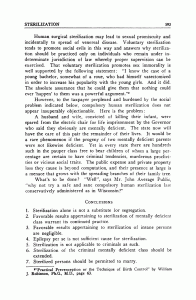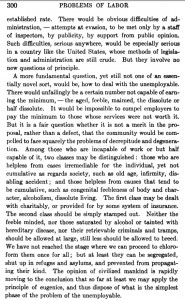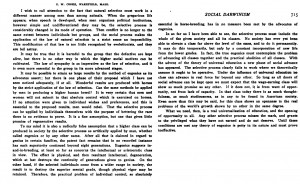Alexis Carrel, Nobel Prize Winner. Man the Unknown, 1939. [Source] A choice must be made among the multitude of civilized human beings. We have mentioned that natural selection has not played its part for a long while. That many inferior individuals have been conserved through the efforts of hygiene and medicine. But we cannot prevent …
Category: society
Nobel Prize Winner Carrel: Euthanize the Defectives and Criminals
Alexis Carrel, Nobel Prize Winner. Man the Unknown, 1939. [Source] There remains the unsolved problem of the immense number of defectives and criminals. They are an enormous burden for the part of the population that has remained normal. As already pointed out, gigantic sums are now required to maintain prisons and insane asylums and protect …
Sterilization May Lead to Sexual Promiscuity, Frank C. Richmond, 1934
Frank C. Richmond, Sterilization in Wisconsin, Journal of Criminal Law and Criminology, Vol. 25, Issue 4 (November-December), Winter, 1934. Page: 593. Human surgical sterilization may lead to sexual promiscuity and incidentally to spread of venereal disease. Voluntary sterilization tends to promote social evils in this way and answers why sterilization should be practiced only on …
Taussig: The breeding of men, eugenics, and progress. 1911
SOURCE: Frank Taussig, Principles of Economics, Volume II, 1911. Pages 233-237. This movement is steadily extending, and is gradually affecting not only those who are usually thought of as being in a more special sense “native born,” but the descendants of the immigrants as well. The influence of free institutions and of free opportunities is …
The Minimum Wage As Means to Exterminate Defectives: Taussig, 1911
SOURCE: Frank Taussig, Principles of Economics, Volume II, 1911. Pages 299-300. As with legislation on hours, factory conditions, and the like, a compulsory minimum wages rate might serve simply to regulate the plane of competition. All employers would be affected alike; no one could undersell the others by cutting below the established rate. There would …
Child Labor Laws as Eugenics Policy
Source: Dr. Frank a Fetter, Cornell University, in a discussion of “Western Civilization and the Birth-Rate”, as found in The American Journal of Sociology, 1907, page 619. The paper mentions but one recent social change which tends definitely and positively to reduce the families of the unskilled classes, namely, child-labor legislation. Such laws as these …
Universal Education a Pre-Requisite for Effective Eugenics Policies
Source: G.W. Cooke, discussing ‘Social Darwinism’ in American Journal of Sociology 12 (March 1907), 714-715. Below the image is OCR scanned text. If anyone would like to send a cleaned edition, that would be greatly appreciated. I wish to call attention to the fact that natural selection must work in a different manner among men …
E.A. Ross and the Difference in Races
Source: E.A. Ross, discussing ‘Social Darwinism’ in American Journal of Sociology 12 (March 1907), 715. Strongly attracted as I am by the hopeful and noble views that have been expressed, I cannot but feel that Dr. Wells’s is right. The theory that races are virtually equal in capacity leads to such monumental follies as lining …
Excerpt: Darwin’s Dilemma as told by Bertrand Russell, from Designing Babies
From Designing Babies: The Brave New World of Reproductive Technology by Roger Gosden. W.H. Freeman and Company, New York. 1999. Page 3-4 According to Darwin’s theory, natural selection decides which individuals are fit to survive and breed. So powerful was this idea that it quickly engaged not only fellow biologists but also intellectuals who were …
Julian Huxley: Birth Control, Family Planning or Population Control All the Same Thing; Taking Control of Human Evolution (1963)
Julian Huxley is a direct descendant of “Darwin’s Bulldog”, Thomas Huxley. In this lecture from 1963, he makes it clear that birth control is family planning is population control. He argues that the goal should be improving the ‘quality of human beings.’ The word for that, of course, is eugenics. In other words, population control …
- 1
- 2




Recent Comments